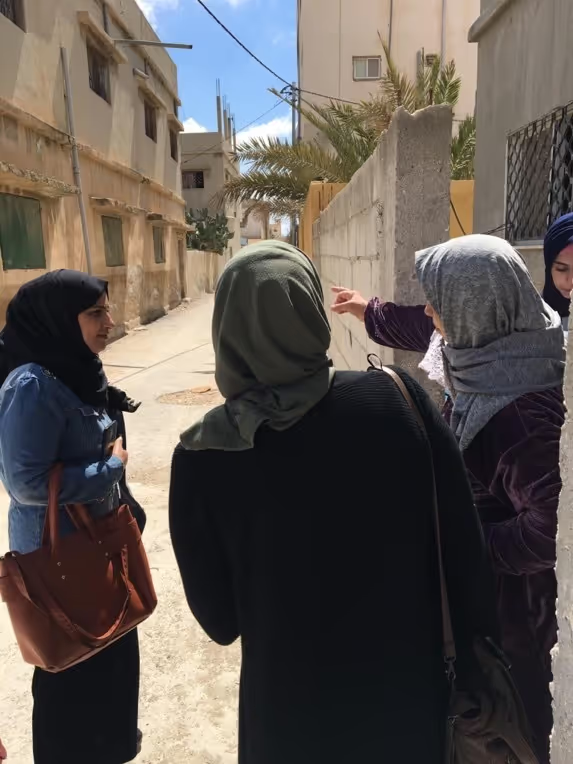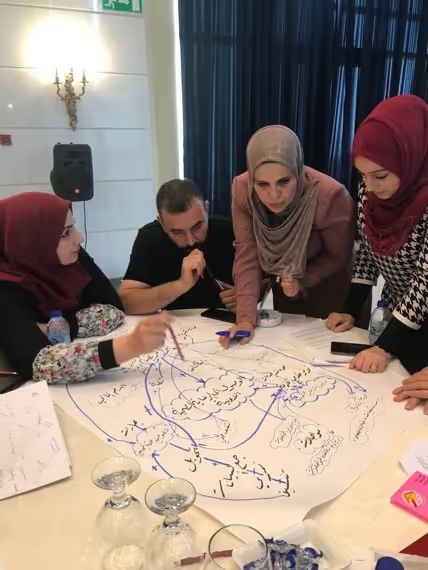Updates from Our Research: NCDs Among Syrian Refugees in Jordan

Syrian refugees and vulnerable Jordanians face unique challenges in accessing care for non-communicable diseases (NCD) in Jordan. Community health workers/volunteers have been used by NGOs in Jordan, but both their formal roles and routine use are limited in Jordan. Our project is designed to improve a community health worker (CHW) model for care of non-communicable diseases, specifically diabetes and high blood pressure, in a humanitarian context. You can find a full description of our research here.
During the first phase of our study, we conducted a population-based survey in International Rescue Committee (IRC)-covered catchment areas in Ramtha and Mafraq governorates, using nurses as data collectors. This survey screened individuals over 30 for high blood sugar and high blood pressure, examined barriers faced by refugees in accessing care, and screened for prevalence of complications of disease.
Data collectors reflected on multiple instances where screening refugees in the community for diabetes and high blood pressure successfully connected patients in need to care. For example, a Syrian woman with persistent fatigue screened positive for diabetes after her blood sugar was checked by a nurse/CHV data collection team. This patient was successfully referred to the IRC clinic, and remains in care for her disease. Another team highlighted a man with previously un-diagnosed, stage 3 hypertension who screened positive in his home and was similarly successfully linked to care. Nurses and CHVs uniformly felt proud of their ability to connect with refugees, often with previously unidentified needs, in their homes.

We then convened a participatory workshop with stakeholders in refugee health care in Jordan to explore means to improve community health approaches to non-communicable disease care in Jordan. We used a methodology called causal loop analysis, drawn from systems dynamics theory, which provides a means to understand complex systems. During a two-day workshop held in Amman from 24th to 25th June 2019, government and NGO leadership, patients, and health care providers including CHVs collaborated to produce a schematic of the primary health care system for refugees and to generate key variables within and the relationships between them. Based on these inputs and multiple key informant interviews, we generated a final causal loop diagram. This causal loop diagram identifies gaps in care, key barriers, and what key components might be included in a CHV program for management of diabetes and high blood pressure among Syrian refugees and vulnerable Jordanians in Jordan. The final causal loop diagram can be used to understand not only current relationships between variables but how those variables might interact over time. Causal loop diagrams may also help predict how a planned intervention might impact a community.
We are now using results of the survey and causal loop diagram to develop an improved community health volunteer strategy which can help to manage care for Syrian refugees and vulnerable Jordanians with diabetes and high blood pressure. This improved strategy will be implemented and prospectively studied over the remaining period of our research.
We look forward to sharing our study with regional and global partners over the coming months.
Parveen Parmar and Ruwan Ratnayake (Principal Investigators)
Stay updated
Sign up for our newsletter to receive regular updates on resources, news, and insights like this. Don’t miss out on important information that can help you stay informed and engaged.
Related articles


.png)
Explore Elrha
Learn more about our mission, the organisations we support, and the resources we provide to drive research and innovation in humanitarian response.